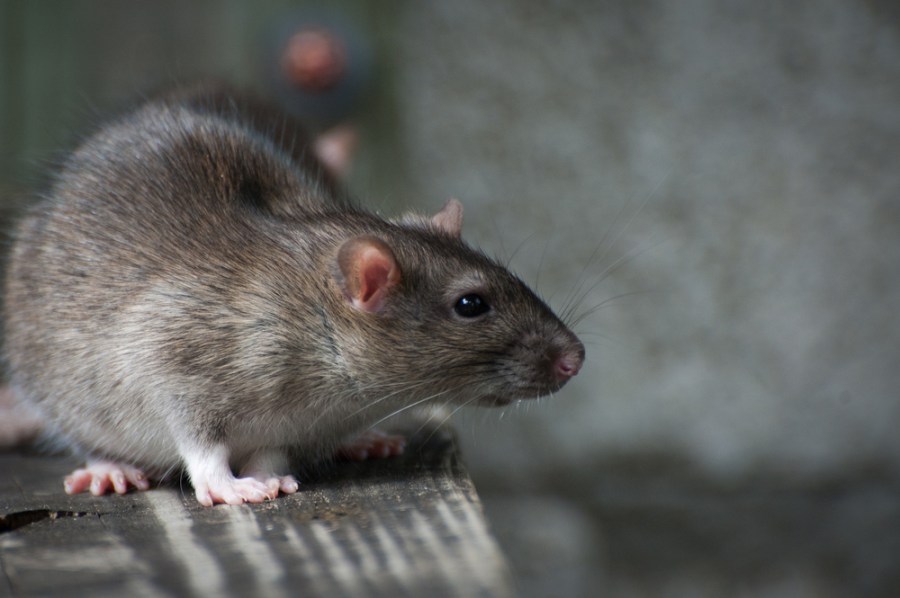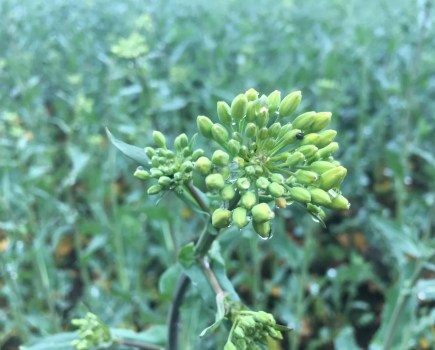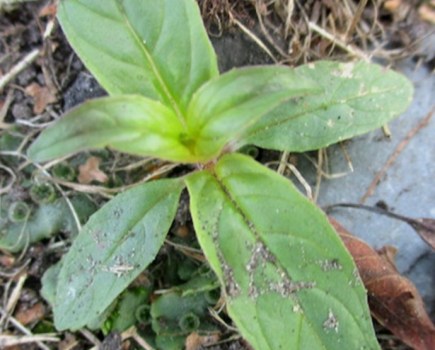Since October, all new stock of rodenticide products includes a ‘stewardship phrase’ on the label. CPM finds out what this means for on-farm rodent control.
Rodent control may be unglamorous but it can be an essential part of everyday farming operations.
Failure to get it right can have implications for the health of those living and working on the units. But there’s also a risk to the health of any livestock under their management as well as the safety and wholesomeness of food products leaving the farm.
A rat attack can lead to other issues beyond health and food safety concerns. It’s estimated that some 50% of farm fires in the UK can be attributed to rats gnawing electrical cables, and rodent damage to valuable seasonal machinery such as combine harvesters in store can be a costly and time-wasting problem.
The EU Biocides Regulation (BPR) of 2012 introduced new authorisation procedures for biocidal products including anticoagulant rodenticides. There’s been growing concern about the toxicity of the anticoagulant products that are in much of the baits used in the UK, says Richard Moseley, technical manager at rodenticide manufacturer Bayer.
“The effect anti-coagulant products have on the environment, particularly to raptor species at the top of the food chain, is one of the issues, as is the resistance which rodents are developing to some of these active ingredients.”
Anti-coagulant toxicity
The toxicity of anti-coagulant products and their residues in wildlife could have led to these products being withdrawn from the market for outdoor use altogether, he explains.
But the Health and Safety Executive (HSE), which is responsible for implementing the BPR in the UK, realised that there were no effective alternatives to anticoagulant rodenticides for control of rats and mice.
To help mitigate the adverse effects of these products, HSE in consultation with the industry, has introduced a UK Rodenticide Stewardship Regime, explains Richard Moseley.

The aim of the new stewardship regime is to restrict rodenticide availability to ensure they’re used responsibly, says Richard Moseley.
This aims to restrict the availability of rodenticides for outdoor use to ensure they’re used responsibly, to protect their efficacy while not adversely affecting non-target species, such as owls, that may consume poisoned rodents.
“The new stewardship phrase now on the label of new stocks of rodenticide states that they can only be applied by certified individuals, who can demonstrate compliance with UK rodenticide stewardship or are members of some farm assurance schemes.”
The cut off for old label products (without the stewardship phrase) was 1 Oct 2016 and where old stock has been purchased, it may be legitimately used up until 31 March 2017.
Those that are members of a stewardship-approved farm assurance scheme will be permitted to purchase and use products with the new labelling until the end of Dec 2017.
To become certified as ‘competent’, farmers must enrol in an accredited training course and pass an exam. The courses are run by several organisations that are all recognised by the cross-industry Campaign for Responsible Rodenticide Use (CRRU) which promotes best practice and appropriate use of rodent control products.
There are approximately 11 different qualifications to choose from, which can be taken at various locations across the country on numerous dates.
There are some certifications that permit ‘grandfather rights’, applicable to individuals that obtained the pest control certification between certain dates, to purchase and use rodenticides labelled under the stewardship requirements after 1 Oct 2016.
Last-chance saloon
Richard Moseley describes the changes as a “last-chance saloon” for the pest control sector to demonstrate that it can use these poisons responsibly. If the stewardship measures aren’t shown to be effective, the products could be further restricted or even withdrawn, he warns.
“This is a very serious issue and needs the co-operation of all major users – professional pest controllers, farmers and gamekeepers,” he continues.
“While the message has been communicated effectively to the relatively small number of professional pest controllers, the larger numbers of farmers and gamekeepers are harder to reach.
“It’s no longer good enough just to put down poison at the first sign of rodent activity and persist in the belief that full bait boxes mean the problem is being dealt with. A more holistic approach is needed,” he reckons.
“Measures must be taken to prevent non-target rodents from accessing the poison, and to stop the bodies of both target and non-target rodents getting into the environmental food chain so that residues don’t accumulate in predatory species.”
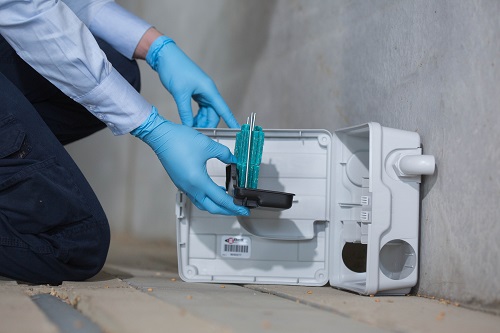
Measures must be taken to prevent non-target rodents from accessing the poison.
NFU senior plant health adviser, Emma Hamer, says the union – a CRRU stakeholder – has worked hard to communicate the changes to its members at national and county levels and to secure the extension for members of assurance schemes.
There’s a need for a change of mindset over rodent control, she stresses. “It’s not enough to use permanent bait boxes and assume the problem is solved.
“Farmers must carefully assess the risk of rodent activity on their units, and take actions to prevent it, using rodenticides as a last resort. There’s access to excellent training through the CRRU or the AHDB’s online training hub,” she points out.
Emma Hamer’s aware of a small number of farmers who resent the changes and what they see as additional “red tape”, but the risk of losing the anticoagulant rodenticides far outweighs these objections, she believes.
“Farmers who are unwilling to undergo the training to obtain a certificate of competence can always outsource the work to a professional pest controller,” she advises.
Professional approach
Charles Phillips is divisional director of Barrettine Environmental Health, which supplies pest control products and training to professional pest controllers.
His business fully supports the CRRU approach and its best practice guidelines, which stress that rodenticides are just one method of pest control and must be used in tandem with good housekeeping, rodent proofing and trapping, rather than just as the default option.
“It’s unacceptable to use second generation products where housekeeping is not up to standard,” emphasises Charles Phillips.
“Alternatives must be considered – tidy sites that are less attractive to rodents and trapping are all methods that can reduce rodent populations.
“There’s currently no alternative to the anticoagulant rodenticide products on the market,” he continues.
“Therefore a balance is needed to protect both the efficacy of these products and the non-target species in the wider environment, while achieving the standards of control needed to protect society from the bacterial and parasitic diseases spread by rodents.”
Care in store
Matthew Benton is a professional pest controller with MKB Environmental Services, based near Lincoln, with a large number of agricultural and rural business customers.
He says he’s often surprised that the care and attention to detail that farmers put into protecting their growing crops in the field isn’t continued once the harvested crop is in store.
Stewardship measures are vital, he believes. “Without tighter controls, occasional users may be tempted to use larger dose rates and leave rodenticide baits out for longer than is needed, posing a greater risk to non-target species and the wider environment.
“Also rodenticides are expensive products – farmers can get better control for less money with a more holistic approach to their pest control.”
Matthew Benton believes the new rules are likely to deter those who put out bait at the first sight of a rodent, rather than adopting an ongoing risk assessment approach.
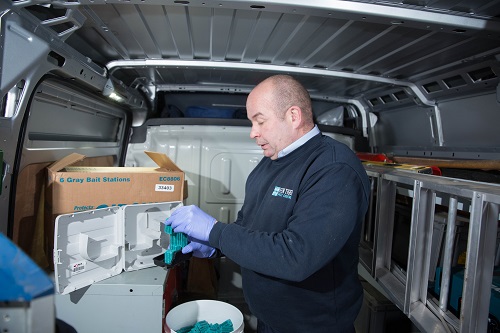
One option to ensure compliance is to use a professional pest control contractor.
Andrew Bowley, a Leics arable farmer, has attended a local course at Park Hill Training and says he’s now more confident about treating rodents.
“We looked at different methods of application and different types of treatment, as well as studying rodent behaviour and life cycles, so that we can control pests in the most environmentally friendly and effective way.
“The more educated we are in rodent control – the more successful our efforts will be.”
Rodenticide Stewardship – what are your options:
- Have a certificate from an approved training programme and awarding organisation, confirming your professional competence.
- Be a member of a UK farm assurance scheme which has among its standards a structured, documented and audited programme of rodenticide pest management.
- Use a professional pest control contractor that employs technicians who themselves have approved certificates.
- Buy and use amateur rodenticide products (which refers to pack sizes of up to 1.5kg.)
CRRU approved farm assurance schemes:
Members of the following schemes do not require an additional qualification to purchase or apply rodenticides until 31 Dec 2017:
- British Egg Industry Council Code of Practice for Lion Eggs
- Duck Assurance Scheme (Breeder Replacement, Breeder Layers, Hatcheries, Table Birds, Free-Range Table Birds)
- Agricultural Industries Confederation (Compound Feeds, Combinable Crops and Animal Feeds)
- Red Tractor Farm Assurance (Beef and Lamb, Dairy, Combinable Crops and Sugar Beet, Fresh Produce, Pigs, Poultry)
- Quality Meat Scotland (Cattle and Sheep, Pigs)
- Farm Assured Welsh Livestock (Beef and Lamb)
- Scottish Quality Crops
- Northern Ireland Farm Quality Assurance Scheme (Beef and Lamb, Cereals)
- Quality British Turkey

